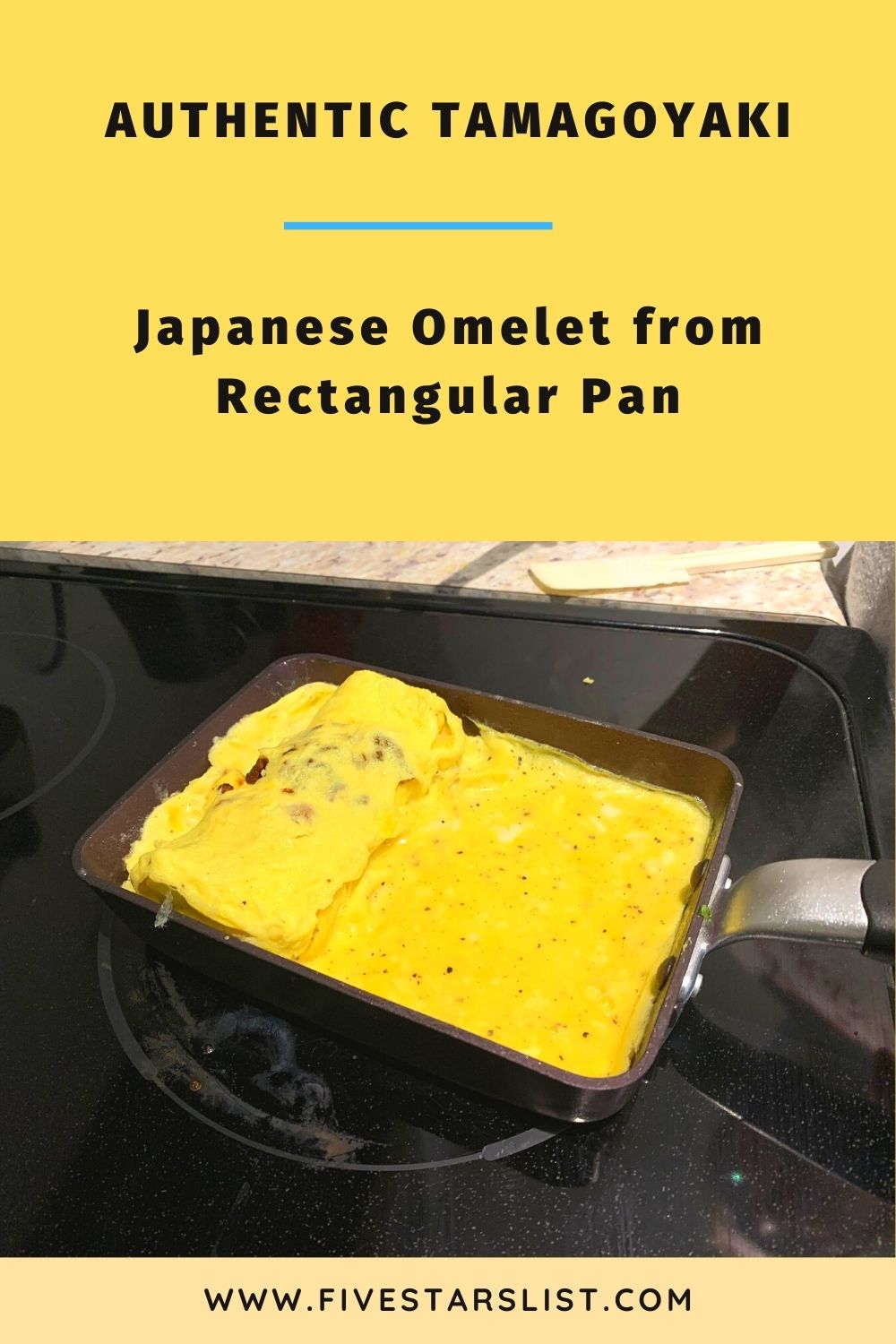As an Amazon Associate I earn from qualifying purchases.
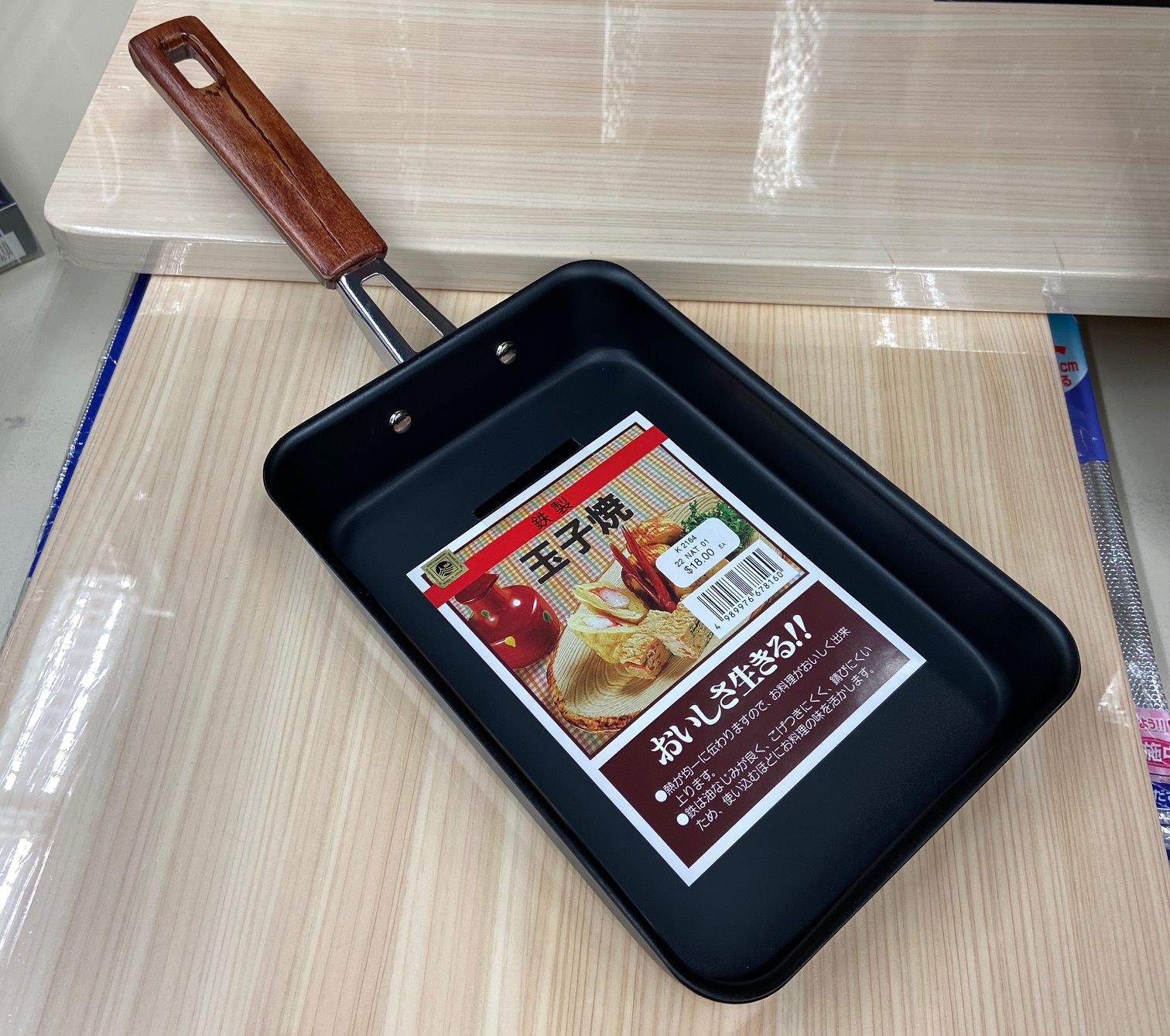
Tamagoyaki Pan by fivestarslist.com
Japanese omelet or Tamagoyaki is a fluffy and airy sensation of only a few ingredients that are traditionally served for breakfast or as a topping for sushi.
It’s a rolled omelet or Japanese version of an omelet.
Although it is excellent in the simplest variant, many recipes include various additions – Nori seaweed, sushi rice, vegetables such as leeks, onions, carrots, and many other ingredients.
In Japan, Tamagoyaki is prepared in a square pan called Tamagoyakiki, but it can also be made in the ordinary round pan you already own.
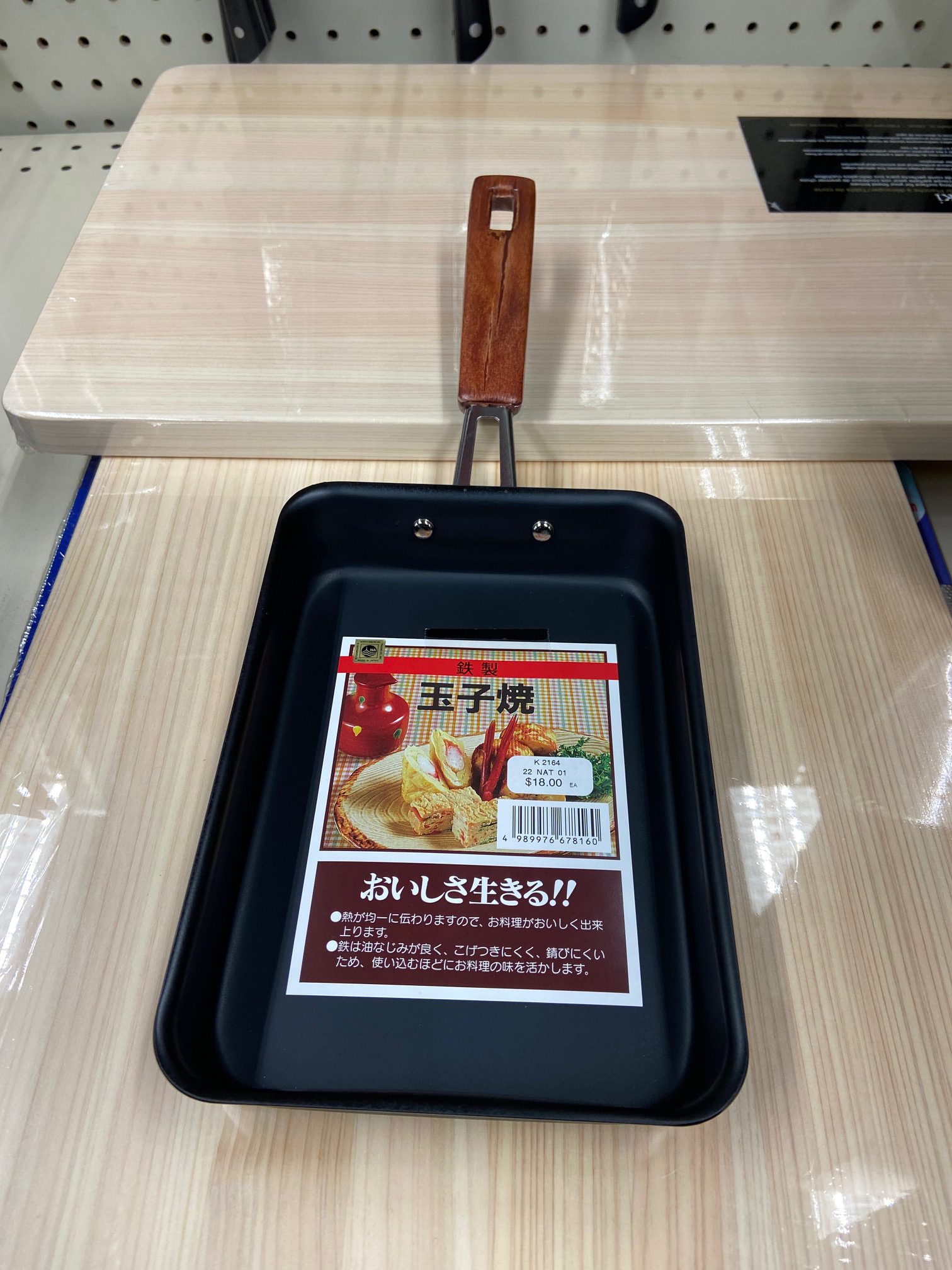
Photo by Five Stars List
The main difference in the technique of preparation compared to how we are used to prepare the omelet is that the whole mixture is not added to the pan at once, but poured several times to harden just enough to be rolled into a roll.
| Preview | Product | |
|---|---|---|
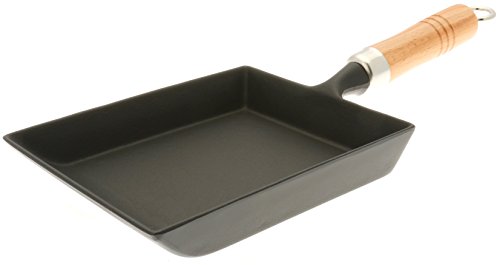
|
Iwachu Iron Tamagoyaki Omelette Pan, Black | Check Price |

|
ROCKURWOK Nonstick Tamagoyaki Pan, 7” x 6” Japanese Omelette Pan, Non-stick Egg Roll Pans,... | Check Price |
One of the chef’s tricks to make the omelet airier is to squeeze the egg mixture through a strainer before cooking, so if you want, you can try this method. If you do not have a brush for coating the pan with oil, a piece of paper towel with which you can coat the pan will also serve.
Another important thing we’re going to mention here is Dashi since it’s important for the taste of Tamagoyaki.
Dashi is an ingredient often used in powder form in Japan, and it is a dehydrated foundation, which you can replace with a combination of mirin and soy sauce – a teaspoon of each will be enough for a fine taste, with just a pinch of salt. You could give it just a touch of sesame oil, too!
Authentic Tamagoyaki, thanks to the spices, has a savory and slightly sweet taste.
The mixture should be like the one you make for crepes.
You should keep the temperature on the minimum and each layer thin as possible, and wet, too.
Tamagoyaki Recipe
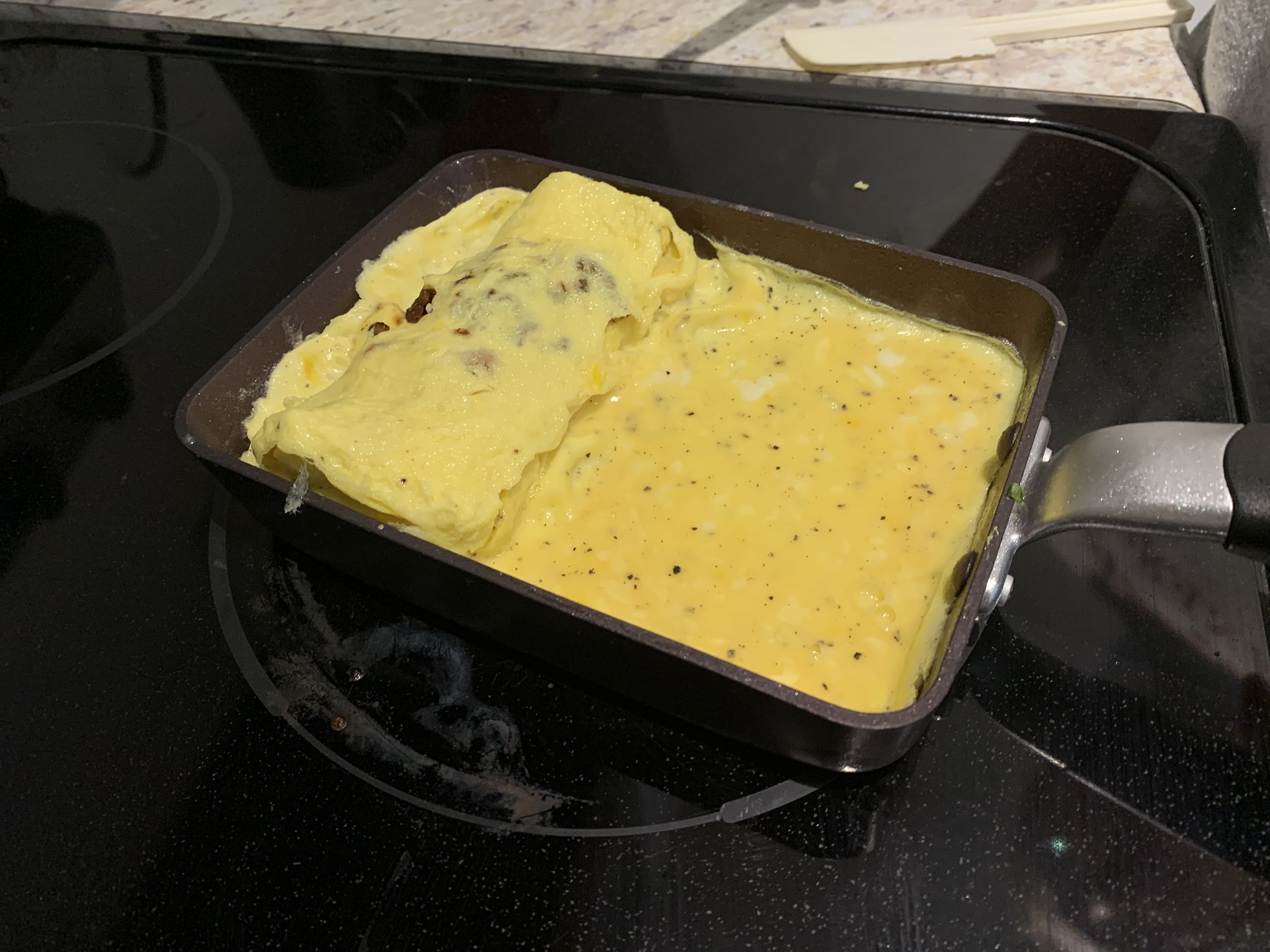
Tamagoyaki in Pan by Estelle Russo
Ingredients:
- ⅛ Teaspoons of dashi powder
- ⅛ Teaspoons of salt
- ¼ Teaspoons of soy sauce
- 1 Teaspoon of sugar
- ¼ Cups of water (60 ml)
- 2 Eggs
- Oil
Directions:
- Combine the dashi, salt, sugar, soy sauce, and water in a small bowl.
- Whisk the eggs and add the prepared spice and water mixture to a medium bowl. Stir until well combined. Actually, beat the eggs until they are perfectly smooth.
- Heat a skillet over medium heat and coat it with a thin layer of oil.
- Pour a third of the egg mixture into the pan and stir quickly to cover the entire pan. When the egg is half-squeezed, roll it lightly (you can do this with wooden sticks) and then pour in another third of the egg mixture.
- Don’t forget to lightly oil the pan between the layers.
- Lift the bent egg and let the mixture flow under it. When it gets half stiff, roll the omelet and repeat the process with the rest of the mixture. Cut into bite-sized pieces.
Now that we’ve solved the mystery of what Tamagoyaki really is and how to prepare it in the comfort of your home, we’re going to introduce you to the most popular pan to make authentic Tamagoyaki.
Like we previously wrote, you can make Tamagoyaki in a round pan, too, so why do Japanese prefer a square pan? Well, you can roll it a lot easier than in a round pan, Tamagoyaki made in the rectangular pan also fits better into lunch boxes – it’s a common item for bento.
Best Cast Iron Tamagoyaki Pan – Made by Iwachu

This Tamagoyaki pan is made out of good quality and high-grade cast iron. Iwachi is one of the finest and most respected manufacturers of Japanese iron. We’re talking about the company’s history of over 100 years.
Since the pan is pre-seasoned by the manufacturer you may notice some black residue on the surface. Thus we recommend you wash the pan with soap and water only. Dry it thoroughly, and then season it as you would do with any cast-iron pan.
This means you should coat it with oil and put it into the oven for about 1 hour at a temperature of 400-450F.
When coating it with oil, you can use a piece of rag or a kitchen towel. We absolutely recommend you to use a piece of rag instead of kitchen paper as sometimes kitchen paper leaves a residue and that goes into your food.
Although the pan is quite pricey compared to the other Tamagoyaki pans, this cast-iron square pan is totally worth its premium cost.
The pan is made in Japan and of cast iron and comes with a pretty durable pre-seasoning applied to it. That’s why you won’t see the eggs sticking to the bottom of the pan.
The best thing about this Tamagoyaki pan that I found is that the manufacturer has made the front edge of the pan quite curved to ensure the easy sliding of the egg spatula to roll the rectangular omelet easily without damage.
Next, the size is neither too small nor too big but rather somewhere in the middle. You need to roll this omelet while it’s at an intermediate state – somewhere between uncooked and fully cooked. Only that way you can roll it easily.
The pan dimensions are 14.25 x 6 x 1.25 inches and the item weight is 2.7 pounds.
Check PriceBest Non-Stick Tamagoyaki Pan – made by Rockurwok

Even if the authentic Tamagoyaki is made of cast-iron, we’re aware there is a whole bunch of people who don’t think that cast-iron and non-sticking can go well together. Besides this, Iwachu can seem too pricey, especially if you’re not a Tamagoyaki fan, or let’s say you’re a Tamagoyaki newbie.
That’s why we’ve prepared plan B or the second option.
It’s a non-stick Tamagoyaki pan, made of aluminum at an affordable price. Besides being made of aluminum and coated with PFOA-free stone coating, the body of the pan contains two heat-conducting layers. This means that the pan heats quickly and evenly. Plus, you get silicone utensils set – the spatula and the brush. To prevent the coating from scratching, it’s recommended to use silicone or wooden utensils with this Tamagoyaki pan.
You need to be very careful with the handle (which is, btw, ergonomically designed) since it’s very short and can become pretty hot.
The pan dimensions are 15.47 x 6.69 x 2.6 inches and the item weight is 1.43 pounds.
Check PriceImage source: Amazon Product Advertising API
Amazon and the Amazon logo are trademarks of Amazon.com, Inc, or its affiliates.
Last update on 2024-07-26 / Affiliate links / Images from Amazon Product Advertising API

